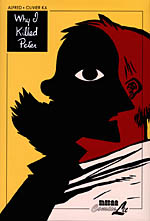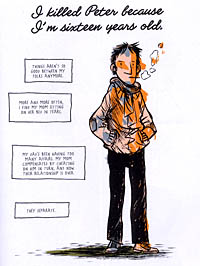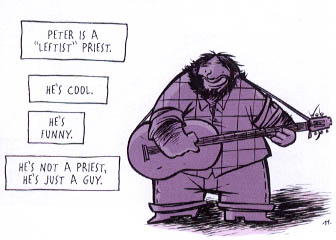 Written by Olivier Ka
Written by Olivier Ka
Art by Alfred
112 pages, color
Published by NBM
I suspect that people who pick up Why I Killed Peter based solely on the name might be a little disappointed. They might be expecting a thriller, probably about a murderer, perhaps with some action and suspense built into it. It’s certainly an evocative title for a book, which is no doubt why Olivier Ka and Alfred chose it. What you’ll actually get with Why I Killed Peter, though, is a disturbing autobiographical story that shows just how hard it can be to truly let go of childhood traumas.
 When Olivier is a small child, he’s unknowingly being pulled in two very different directions. His conservative grandparents, who go to church every day, want him to embrace religion and their way of life. His liberal parents, on the other hand, aren’t happy with the idea, even though one of their best friends is a young local priest named Peter. Tormented by threats of Hell, Olivier isn’t sure what he has in his future—and then, at twelve years old, everything changes. That’s the age that Olivier first goes to summer camp.
When Olivier is a small child, he’s unknowingly being pulled in two very different directions. His conservative grandparents, who go to church every day, want him to embrace religion and their way of life. His liberal parents, on the other hand, aren’t happy with the idea, even though one of their best friends is a young local priest named Peter. Tormented by threats of Hell, Olivier isn’t sure what he has in his future—and then, at twelve years old, everything changes. That’s the age that Olivier first goes to summer camp.
There’s no two ways about it, Why I Killed Peter isn’t always a pleasant book to read, and it’s best to get that aspect of the book first. It’s in no small part thanks to Ka’s unflinching telling of events and what happened to him—not only at camp, but before and afterwards. Abuse of any sort is always an uncomfortable subject, and Ka’s narration of the event in question is certainly squirm-inducing. The moment itself is certainly just a fraction of the book, but its repercussions echo through the rest of Why I Killed Peter and understandably so. This is thanks to Ka laying out all the rest of his life, both before and after, in a way that the significance of this moment is hard to ignore. It’s a good move, also in part because Ka is able to make the rest of his life compelling reading as well. Honestly, even before the event at summer camp occurs, Ka has told of his early life in a way that reminded me of David B.’s Epileptic memoir, a glimpse into a different life that is fascinating to read about. He’s a good storyteller, really letting the reader get into his head and feelings, and it’s that ability that carries the rest of Why I Killed Peter forward.
 Alfred’s art for Why I Killed Peter is also very strong; having to draw someone between the ages of 7 and 35 in a way that makes him both recognizably the same person, yet different at each part of his life, is no small feat. Alfred manages it with apparent ease, though, always making Olivier look like himself even as he grows and matures into a man. He’s able to tackle a lot of the visually meatier parts of the book, like his fears of demons from Hell or Peter’s dog, in a way that reminded me a lot of the way that a child would have drawn the event, even while retaining Alfred’s own style. They’re jagged and full of loose lines and menace, and it meshes well with Henri Meunier’s colors to pop off the page. I will admit that I was a tiny bit disappointed by the several pages of photographs used towards the end of the book; I understand what Alfred and Ka were going for, adding in the cue to the reader that this all really did happen, but it feels unnecessary. Everything in Why I Killed Peter felt real enough already that instead it threw me slightly out of the book, and it was really quite a disappointment for the book to take this detour. Fortunately, it’s not a very long part of the book, and the final pages do recover nicely from this unfortunately misstep.
Alfred’s art for Why I Killed Peter is also very strong; having to draw someone between the ages of 7 and 35 in a way that makes him both recognizably the same person, yet different at each part of his life, is no small feat. Alfred manages it with apparent ease, though, always making Olivier look like himself even as he grows and matures into a man. He’s able to tackle a lot of the visually meatier parts of the book, like his fears of demons from Hell or Peter’s dog, in a way that reminded me a lot of the way that a child would have drawn the event, even while retaining Alfred’s own style. They’re jagged and full of loose lines and menace, and it meshes well with Henri Meunier’s colors to pop off the page. I will admit that I was a tiny bit disappointed by the several pages of photographs used towards the end of the book; I understand what Alfred and Ka were going for, adding in the cue to the reader that this all really did happen, but it feels unnecessary. Everything in Why I Killed Peter felt real enough already that instead it threw me slightly out of the book, and it was really quite a disappointment for the book to take this detour. Fortunately, it’s not a very long part of the book, and the final pages do recover nicely from this unfortunately misstep.
Why I Killed Peter is a grim book in places, but I love that at the same time there’s still always some lightness and joy waiting around the corner. This sort of exorcism of one’s past could have come across very poorly, but it’s thanks to the skills of both Ka and Alfred that it works so well. It’s definitely not an easy book to forget, and it’s an excellent choice for NBM to have translated into English. I’d certainly love to read any other books that either of these creators work on; they might not contain the same emotional punch that Ka’s autobiographical story has, but they’re both proven to be strong enough that I suspect the books would be very good.
Purchase Link: Amazon.com
